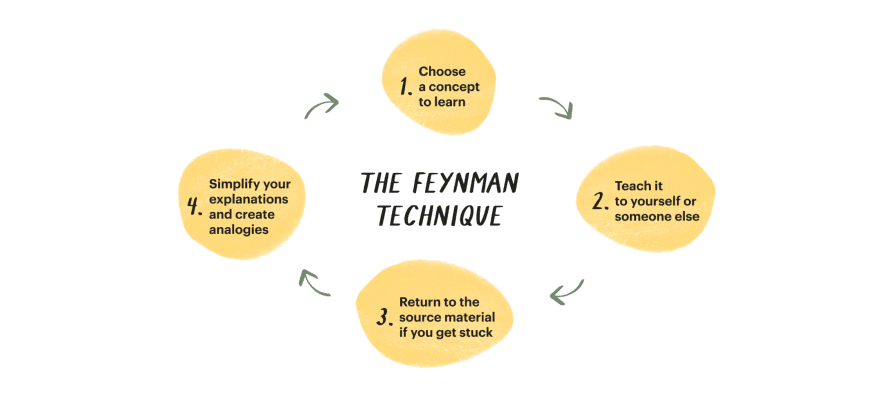The Feynman Learning Technique
Curated from: fs.blog
Ideas, facts & insights covering these topics:
15 ideas
·152K reads
1.16K
7
Explore the World's Best Ideas
Join today and uncover 100+ curated journeys from 50+ topics. Unlock access to our mobile app with extensive features.
The Feynman Learning Technique
The Feynman Learning Technique is a way to supercharge your learning.
Learning doesn't happen from browsing through a book or remembering enough to pass an exam. We learn information when we can explain it and use it in several situations. The Feynman Learning Technique is a simple way to help us learn anything.
3.19K
21.1K reads
Four Steps Of The Feynman Technique
The technique is based on the method Richard Feynman originally used.
There are four steps to the Feynman Technique:
- Pretend to teach a concept you want to learn about to a child.
- Identify gaps in your explanation. Fill the gaps by going back to the source material.
- Organize and simplify
- Transmit.
3.72K
17.1K reads
Pretend To Teach A Concept
- Take out a blank sheet of paper.
- Write the name of the subject as your heading.
- Then write down everything you know about the subject as if you were teaching it to a child. Try and explain as simply as possible.
3.04K
14.2K reads
Identify The Gaps In Your Explanation
The areas where you are struggling to explain the points in simple terms or forget something important are where you have some gaps in your understanding.
Now that you know your gaps, go back to the source material. Look up definitions. Augment with other sources. When you can say something in multiple ways using different words, you really understand the subject.
2.93K
10.6K reads
Organize And Simplify
When you have written down notes containing simple explanations, organize them in a narrative that you can tell from start to finish.
If the explanation is not clear, identify your gaps, look up definitions, augment with other sources, then organize and simplify again. You may end up with a binder full of pages that will remind you just how much you do retain.
2.85K
9.57K reads
Transmit (Optional)
The last step is to run it past someone who knows a little of the subject. You can read what you've written or present the material like a lecture. Ask your friends for a few minutes over dinner. The idea is to attempt to transmit the material to at least one person who is not that knowledgeable about it.
The questions you get and the feedback you receive can be used to develop your understanding further.
2.76K
7.87K reads
How To Supercharge Your Learning
The Feynman Technique can also be used for a different way of thinking that allows you to break ideas apart and reconstruct them.
When you have a conversation, and the other person uses words or relationships that you are not familiar with, ask them to explain to you as if you're a child. Doing this will supercharge both of your learning.
2.74K
8.38K reads
What It Means To "Know"
There is a difference between just knowing the name of something and knowing something. We know something when we are able to use that knowledge broadly.
We can learn to know something by taking it apart and seeing how each part works.
2.73K
8.36K reads
"The person who says he knows what he thinks but cannot express it usually does not know what he thinks."
MORTIMER ADLER
2.95K
15K reads
Refine What You Learn
Michel de Montaigne said, "What good does it do us to have our belly full of meat if it is not digested, if it is not transformed into us, if it does not nourish and support us?"
We learn from books, but also from people we talk to, and the various positions, ideas, and opinions we are exposed to. We have to know how to sort through the relevant information and discard what is not worth learning.
2.73K
7.19K reads
Deciding If Someone Really Knows
Decide whether someone else really knows their stuff or is just copying others.
Ask them naive but relevant questions. When you apply your knowledge of the Feynman Technique, you know they should be able to explain it to you in simple terms and must be able to make educated analogies.
2.68K
7.11K reads
Dealing With Uncertainty
Very few ideas are absolutely true. You want to get as close to the truth as you can with the available information.
- Use "grey thinking". It is the ability to put things on a gradient from "probably true" to "probably false".
- Bayesian updating. Start with priori odds (knowledge based on previous experience), and update the odds based on what you learn thereafter.
2.71K
6.68K reads
Realizing That Knowledge Is Not Static
When we investigate if something is true or not, new evidence and methods of experimentation should show a stronger effect, not a weaker one.
We must refine the method for getting at the real truth. If re-tests get weaker and weaker effects, it's likely not true to the magnitude we hoped for.
2.61K
6.16K reads
What Is Possible Vs What Is Probable
The problem is not what is possible - it's what's probable, what is happening. It's impossible that everything that is possible is happening.
You can also not judge the probability of something happening if it has already happened. You have to run an experiment forward to mean anything.
2.61K
6.09K reads
Errors Result From Lack Of Information
Many of the errors that people make come because they don't know they're missing the information they need.
Unless someone can demonstrate a truth to you with real experiments, there's no point in considering their knowledge.
2.66K
6.51K reads
IDEAS CURATED BY
Brian 's ideas are part of this journey:
Learn more about personaldevelopment with this collection
The power of gratitude and positive thinking
Ways to improve your mood
Simple daily habits for a happier life
Related collections
Similar ideas
4 ideas
Learning Through Play
fs.blog
5 ideas
Avoiding Bad Decisions
fs.blog
Read & Learn
20x Faster
without
deepstash
with
deepstash
with
deepstash
Personalized microlearning
—
100+ Learning Journeys
—
Access to 200,000+ ideas
—
Access to the mobile app
—
Unlimited idea saving
—
—
Unlimited history
—
—
Unlimited listening to ideas
—
—
Downloading & offline access
—
—
Supercharge your mind with one idea per day
Enter your email and spend 1 minute every day to learn something new.
I agree to receive email updates





